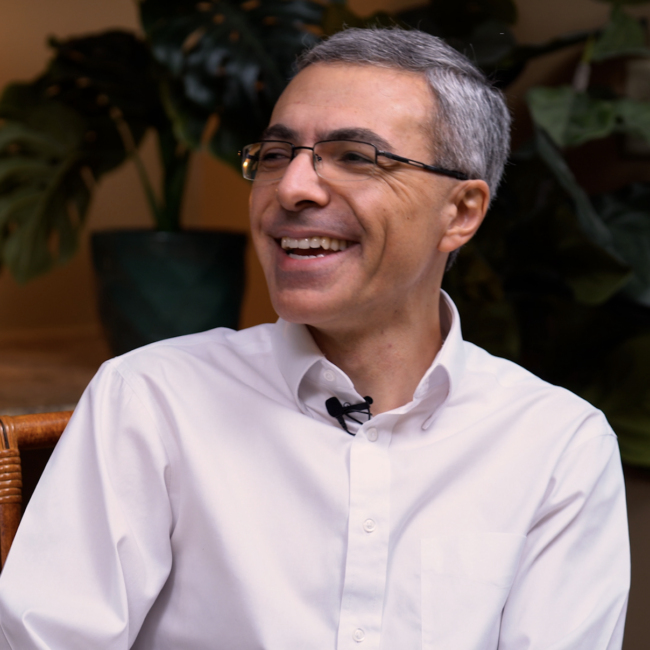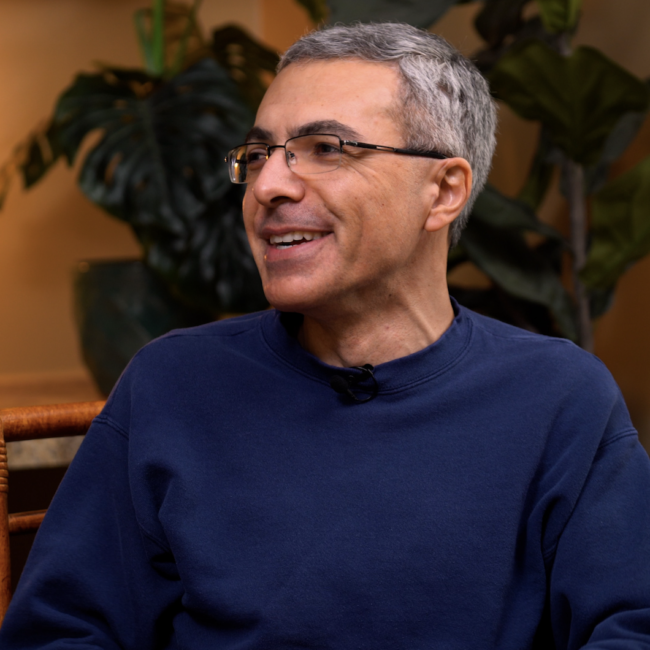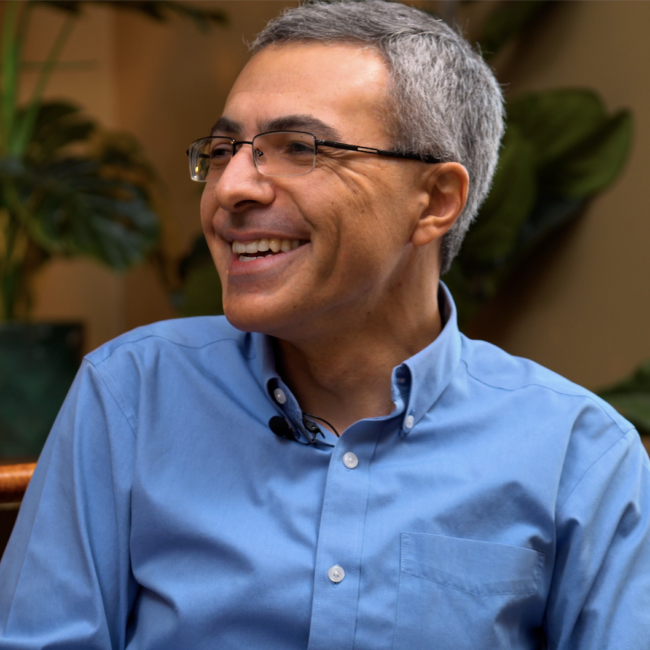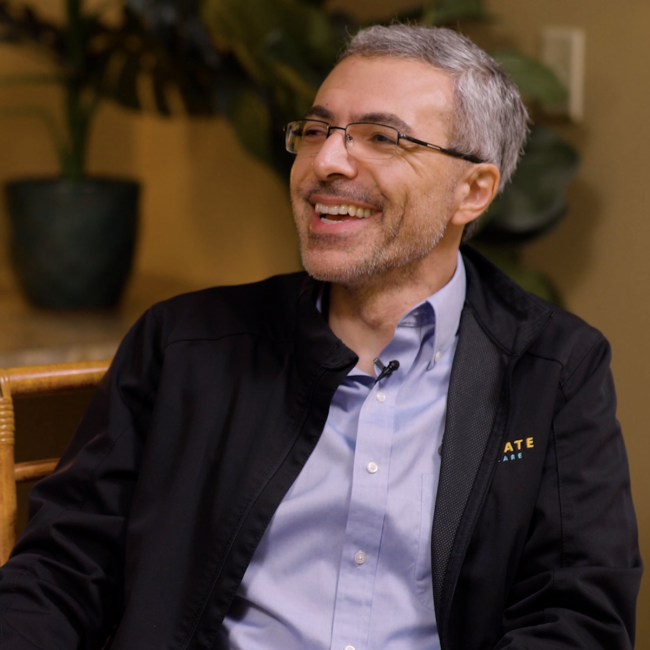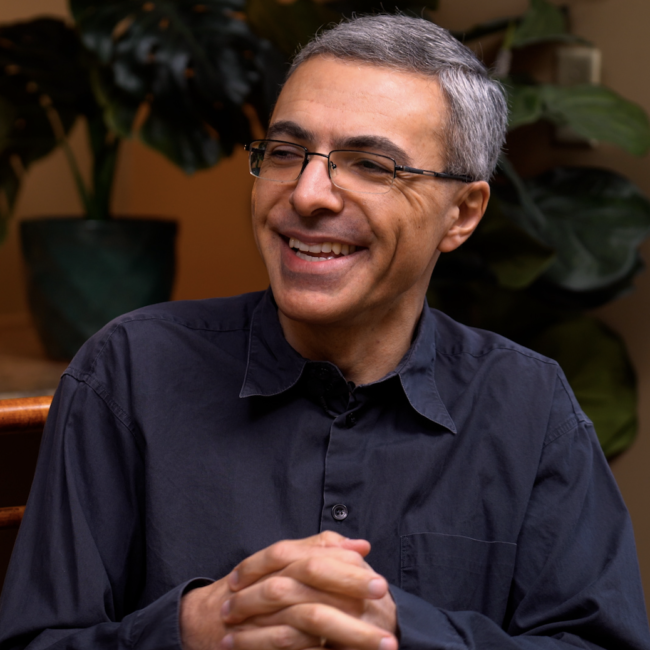
About Episode 3:
Episode Transcript:
Dear Healthcare It’s You: Episode 3
Elisha Yaghmai
And I did that with a private practice family doctor. Okay. And that, I would say, was really the formative experience for me in all of medical school, because I go out to the I go to this clinic and I work with them for two weeks, and then he took two weeks off a vacation. And I kept going to the clinic every day.Elisha Yaghmai
And they had patients scheduled every day. As the doctor, it was it was me and his nurse practitioner. the two of us here of a regular patient of that right. That was coming in. And that that's the kind of thing I don't know if that would take place today.Jo O’Hanlon
Or she would see him is the end.Elisha Yaghmai
He was toward the I think he was at that point already. He was kind of toward the end of his career, I think. I think he represented the end of that.Jo O’Hanlon
Era, afraid of losing a life. Jo O’Hanlon
Welcome back to your health care. It's you. Welcome back to our podcast. We're here with Dr. Elijah Dagmar of the Free state Health care Clinic here in Wichita. Thank you for being here, Dr. Aisha. What we've been talking about so far is Dr. Elijah Jeremiah's medical journey and what that kind of looked like in going through medical school and where we've left off, I believe, is with your fourth year is kind of where we're picking up today.
Jo O’Hanlon
You were in New Orleans during the Hurricane Katrina when that all happened. And so that was part of your medical journey, was being in medical school during that and being shuffled and then ended up having to transfer to I'm sorry, what was the university one more time? Southwest U.T., Southwestern University of Texas. And so that's where you ended up finishing your third year, right?
Jo O’Hanlon
And so we were kind of talking about the abuse of nature of some of the, I don't know, the hospital settings there with your faculty and all of that. So what ended up happening in the fourth year, any changes or more of the same sort of abuse in terms of the kind of lack of oversight, in terms of teaching and just expecting a ton in those ways?
Elisha Yaghmai
Yeah. Third year, I think those that not everyone was abusive, those that were abusive, it wasn't expectations that was the issue. It was it was the way they executed their sort of theoretical teaching. And, you know, for for some of them, it was their criticism was personal, it was persistent, and they created a very difficult work environment. So in other words, they were asking they were asking medical students to do things that medical students were really not equipped to do.
Elisha Yaghmai
Yeah. And then when they failed to do it, not reflecting on the fact that this was completely the wrong set up to get the outcome that I wanted, but instead making it extremely personal in terms of the way that they were approaching it. Right.
Jo O’Hanlon
Of like first.
Elisha Yaghmai
You are stupid, right? That right not hey, this is something that you don't know. Yeah. Hey, you know, here's let me teach you how to do this better. Very, very different. Right? A kind of teaching style that I think almost anyone at any field would agree is probably not the right way to do it. But actually very common through medical education.
Jo O’Hanlon
Right.
Elisha Yaghmai
So fourth year, I would say there's also one of the dynamic in in particularly the third year medical school, at least in at least in the institutions that I was in and and and with my own personal experience, a lot of medical education and we talked about this a little bit last time is fundamentally driven by fear.
Jo O’Hanlon
Right.
Elisha Yaghmai
You have you have high achieving people who are used to getting really good grades, who are now in an environment with a bunch of other people that are like that. They're all competing with each other because they all want certain prestigious residency programs or whatever the case is. Right? Right. So the motivation for many of them, not everyone, but many, is fear of failure or fear of not getting that next gold star.
Elisha Yaghmai
Right. So in other words, it was not enough to have gone from high school to a good college and then gone from college to a good medical school and then, you know, go from medical school into a residency. It needs to be the right residency, right with the right name or the right specialty.
Jo O’Hanlon
And so can I positive. See, is that something that you feel like looking back is more just something that the type of people that ended up in medical school were putting on themselves? Or was this driving fear or is that something that was within the rhetoric of the teaching and such as. Well, but it was pushed that way.
Elisha Yaghmai
It's both. You have people that are predisposed. They're operating in an environment where that behavior is promoted.
Jo O’Hanlon
Yeah.
Elisha Yaghmai
Because, I mean, it doesn't take a genius, right, to, for example, look at the masthead at your medical school and realize that everybody at the top of it. Right. Seems to have they've all got a subspecialty for the people at the very top, seem to have come from one of about ten institutions in general, right? Yeah. I'm training in some of these places.
Elisha Yaghmai
Right. You can look at that. And so if your aspiration and again, I'm not commenting on whether your aspiration is valid or good, right. But if your aspiration is, you know what I'd like to do, I'd like to rise in this institution. And one day I want to be dean of whatever it is. Right. Well, you look at this and say, well, then I think I'm going to probably have to follow a similar path as the people that are already in these positions.
Elisha Yaghmai
Right. Right. So I need to keep going my way up that mountain right into more and more select programs, at least at least by reputation. Right.
Jo O’Hanlon
You don't really.
Elisha Yaghmai
Know anything about these places from the outside. So the motivation driving a lot of a lot of the behaviors is fear rather than love of learning.
Jo O’Hanlon
Right.
Elisha Yaghmai
And that and that's a that's a key difference. And so that speaking at a personal level that had never that never worked for me at any point in my education, even as a younger student, my driver had always been, this is so cool. Like, I just want I just want to learn this, right? I think it's interesting, right?
Elisha Yaghmai
And I and I want to get into it.
Jo O’Hanlon
And I heard early in your story that you were really driven to wanting to fill a need to help as well. I think that that's probably the start of a lot of people's medical journeys at the start.
Jo O’Hanlon
At the beginning, yeah.
Elisha Yaghmai
And then it gets it gets diluted then, right?
Jo O’Hanlon
Yeah.
Elisha Yaghmai
In times of a lot of the conflict I think. Was that right. So medicine, first of all, is a high volume of information right there, giving a ton of information over a very short period time. You need to you need to absorb it and you need to be able to regurgitated in various high pressure situations, exams, oral exams, on rounds, wherever else.
Elisha Yaghmai
Right, Right. That doesn't work for everybody, for one. But there's a lot of fear and stress associated with all of those, all of those things, you know. And so you have that that as one driver of the I think the change the change for me began to take place beginning of fourth year. What they do in fourth year here again, things change over time.
Elisha Yaghmai
So medical education may have shifted, but fourth year you had a little bit more freedom. So you're allowed to go out and begin to work with a little bit less of a tight leash. You weren't somebody with a standing.
Jo O’Hanlon
In the hospital settings you're talking about in the.
Elisha Yaghmai
Hospital. So you could do a sub internship at the hospital and then also even in the outpatient setting. So I had to experiences. I mean, one was I went from a fairly sort of, you know, corrosive work environment actually to my family medicine residency, which took place at John Peter Smith's shout out to JP's and the people that were very different.
Jo O’Hanlon
And that was in your fourth year.
Elisha Yaghmai
That was no, that was.
Jo O’Hanlon
The.
Elisha Yaghmai
Beginning. That was the very end of my third year just before my transition.
Jo O’Hanlon
Although.
Elisha Yaghmai
Very different. They were they so they cared about medicine, they enjoyed learning and doing things, but they were nice, right?
Jo O’Hanlon
Not having that.
Jo O’Hanlon
Huge.
Jo O’Hanlon
Overarching fear was a part of it all. Is that part of it?
Elisha Yaghmai
It was just a different culture. That's just I can describe it. So they were they were kind people.
Jo O’Hanlon
Is that true of everybody in terms of like doctors on down through the facility or what? Well, stands out most.
Elisha Yaghmai
All I can say is that that's the for the people that I worked with in place at that time, they exhibited kindness. So they still cared about trying to do a good job medically.
Jo O’Hanlon
Right.
Elisha Yaghmai
But they were kind. And for a student who had just come from an environment which was the complete opposite of yeah, that was a revelation because I was like, Wow, you can do good medicine and still be a nice person.
Jo O’Hanlon
Right? Yeah, right. It's like an.
Jo O’Hanlon
Example of someone who didn't get chewed up by the machine and set out in that way.
Elisha Yaghmai
That's that's exactly correct. And so I went from then into a, into a sub internship, which I did in the hospital. There again I was working with at that point, my, my closest supervisor was a third year, third year internal medicine resident. At that point I was at Parkland Hospital in Dallas and he also had more of that, I think, kindness in him.
Elisha Yaghmai
So it was just a better environment to learn because it was more it was it was less about fear of reprisal, fear of repercussion and more about how are we going to work with this patient today? Okay, that that's a positive motivation as opposed to the negative motivation, just trying to not get punched. Right. Yeah.
Jo O’Hanlon
These are two.
Elisha Yaghmai
Very different things. Or humiliated or humiliated and right. Yes, metaphorically.
Jo O’Hanlon
Right? Yeah. Sorry.
Elisha Yaghmai
Self. Those are nobody. Punch me.
Jo O’Hanlon
It's legal. We have.
Elisha Yaghmai
But metaphorically they did.
Jo O’Hanlon
So, so.
Jo O’Hanlon
Emotional. This is.
Jo O’Hanlon
Real.
Elisha Yaghmai
That's so working with him was kind of that was very helpful. And there were areas I mean thinking back that there are areas definitely where like I had I just either didn't know enough or I couldn't come up with the things on time. But again, it was just a different environment and it made it encouraging, it made it positive to try to to try to get better.
Jo O’Hanlon
And when you were in that scenario, just because I'm not used to all the jargon and I don't know exactly how it goes. Yeah. So when you're this was a residence residency doctor, what do you call it?
Elisha Yaghmai
Medical resident.
Jo O’Hanlon
They were physical.
Elisha Yaghmai
Medical. You go through medical school, you do four years of medical school, and then you do a residency of a certain number of years, which is basically you're doing practical work at that point. Right? So you are you have your medical degree, but you're not really allowed to do independent practice until you've done a certain number of years.
Elisha Yaghmai
And it varies by specialty of practice. In internal medicine, you do three years of an internal medicine residency. So when you finish your third year, you're officially done. At that point, you could be after you finish, you could be an independent internal medicine doctor.
Jo O’Hanlon
So this was someone in their third year.
Elisha Yaghmai
Right? So he was he was in his last year of residency.
Jo O’Hanlon
And so you go around on rounds with him and, you.
Elisha Yaghmai
Know, you go run errands by yourself, so you go running by yourself. You have a couple of patients to take care of, right. And you're trying to figure out what to do with them clinically. Right. So in third year, you had usually a junior resident in front of you and then a senior resident and then the attending physician.
Elisha Yaghmai
Now you're kind of the junior resident. That's how I would describe it. So that's why it's a sub internship. You're not the intern, you're not the first year resident that's there. But you are you're stepping into that role for a short period of time, right? Yeah. So but what that role facilitated again, was independent learning, right? Yeah. You've been given a case.
Elisha Yaghmai
No, you need to go. No one's there's no multiple choice exam, right. You have to go figure out who is this person, what's wrong with them? What am I going to do about it? What do I do? And then you take your plan back to your supervisors and say, Here's what I think is going on. Here's what I want to do.
Elisha Yaghmai
Here's why I want to do it right. Here's how I'm going to do it. And then they say, thumbs up or no, not a good idea. Let's modify. Right? Okay. I'm a teacher.
Jo O’Hanlon
So you're handling it all on your own, but you're kind of having this check back. That's right. This person ahead of time before you go back for the actual treatment.
Elisha Yaghmai
That's right. Yeah. So you can't just order it yourself. And one you it's checked, but your goal is to formulate an independent plan. Right. And then bring that in for a lot.
Jo O’Hanlon
More practical learning in that some of those ways for just hands on, like checking your actual knowledge of correct how stumped you are or not and a point. Gotcha.
Elisha Yaghmai
So it was a different that was a different animal.
Jo O’Hanlon
Yeah. And so that did that last for your whole fourth year. Then during that that was that was just one of. Yeah.
Elisha Yaghmai
Okay. So then you had to do an outpatient kind of sub internship or outpatient rotation, I guess what I would say and I did that with a with a private practice family doctor and that I would say was really the formative experience for me in all of medical school, because I go out to the I go to this clinic and I work with them for two weeks, and then he took two weeks off on vacation.
Jo O’Hanlon
Okay.
Elisha Yaghmai
And I kept going to the clinic every day. And they had patients scheduled every day as.
Jo O’Hanlon
The new.
Elisha Yaghmai
Doctor. It was it was me and his nurse practitioner. Okay. Two of us taking care of a regular patient panel. Right. That was coming in. And that that's the kind of thing I don't know if that would take place today.
Jo O’Hanlon
I don't is the end.
Elisha Yaghmai
He was toward the I think he was at that point already. He was kind of toward the end of his career, I think. I think he represented the end of the era.
Jo O’Hanlon
Afraid of.
Jo O’Hanlon
Losing a lot. So that's you at this point, your medical to.
Jo O’Hanlon
Anything go wrong?
Elisha Yaghmai
No, actually, but that is the thing, right? So I understood that responsibility, Right? I was like, these people are coming in here.
Jo O’Hanlon
Rare opportunity. Yeah. It's like first in your.
Elisha Yaghmai
Position, my doctor is gone and this was but we didn't have email. There was an email, right? But we were emailing back and forth like we didn't have the ready contact. I forget where he'd gone. I think I've been out of the country for a while, so whether he was checking back in, in the background to see, yeah, I don't know if he may have been doing that, but in terms of our direct communication, we weren't communicating.
Elisha Yaghmai
So it was just, just me. And then and then his nurse practitioner would see her patients. Right. And we would talk about them every day and try to review them. So it was a it was being given responsibility. Yeah. And, and with that responsibility came, I think it went back to that original motivation. Right. I got into this to try to learn a skill to help people.
Elisha Yaghmai
Right. Well, now here I am in a practical situation where these people are coming to me expecting answers.
Jo O’Hanlon
Yeah.
Elisha Yaghmai
What am I going to do? Right? I have to know something. So that motivated a lot of. All right. I got I got to read, you know, I got to look at what cases are coming in and try to learn something before I go in and then after I talk to them and learn more. I got to go read some more about this and try to educate myself and figure out what to do about these cases.
Jo O’Hanlon
Yeah.
Elisha Yaghmai
And that that again, was a very positive motivation. The positive motivation was trying to help people with a real problem. It didn't have anything. I wasn't getting a test on it. There was no grade assigned at the end of it or whatever the case was. This was just people need help. What are you going to do now? You know, at least enough to know where to look to find the answer.
Elisha Yaghmai
Right?
Jo O’Hanlon
Right.
Elisha Yaghmai
Even if you don't know the answer, what are you going to do? Right.
Jo O’Hanlon
Was there a difference in that scenario also because of it being a outpatient clinic, rather than in the hospital setting?
Elisha Yaghmai
I mean, those the main difference was different types of problems at different times. But occasionally people would come in to the outpatient clinic with an inpatient problem.
Jo O’Hanlon
And.
Elisha Yaghmai
Would come in and be realistic. And you'd have to yeah, we'd have to order some tests and figure out what to do. And then in some cases you sent them to the hospital if you don't have the capability to handle it. The Yes. So it was different levels of severity and just different types of problems. Right. But but I think the main difference was, was really the work environment.
Elisha Yaghmai
It was the people I was working with. And again, that that autonomy and that responsibility of, you know, we expect you to we expect you to handle this.
Jo O’Hanlon
Right. Right. Did that kind of I mean, did you have a question for yourself prior to that setting of whether you really could handle it? I mean, it sounds like there was a lot of the fear mongering and a lot of that. Yeah. You know, shaming of like not knowing things that you maybe shouldn't know yet even. But to this point now you're in the last year of medical school was that kind of of reassurance of like this is the right yeah for you.
Elisha Yaghmai
I didn't you know as for even during the roughest times I would say I didn't necessarily feel like that it was something I could not do. Yeah, I did feel like this is a thing I do not like.
Jo O’Hanlon
Yeah, yeah.
Elisha Yaghmai
I don't know how to describe it. It would be like I just think about any anything in your life where you have the ability to do it, but you do not enjoy the thing itself. You don't enjoy that activity. You don't enjoy the process of gaining the skill at it, right?
Jo O’Hanlon
It's like getting get it running or something like that.
Jo O’Hanlon
That's probably the time for some of us. Like, I mean, there's.
Jo O’Hanlon
Like that more like I can do.
Jo O’Hanlon
It. I know I enjoy it. Like, not at all.
Jo O’Hanlon
But you found some enjoyment in that.
Elisha Yaghmai
Yeah. Yeah. I would say for the first time, that's probably the best way to describe it. I actually found some joy in the work.
Jo O’Hanlon
Life.
Elisha Yaghmai
For the very first time ever because previously it was just a miserable slog through. Right. One requirement after another one. Yeah. You know, sort of competitive. Yeah, after another.
Jo O’Hanlon
How long did that joy last you that.
Elisha Yaghmai
Lasted through most of fourth year, actually, because you had more freedom to choose your electives, right? So you could do things that were interesting and you went around and did stuff and start interviewing for residency programs. So you're traveling to do that. You did a rotation in forensic pathology, right? Which is actually even weirder than it appears on TV.
Elisha Yaghmai
But it's actually really cool.
Jo O’Hanlon
It's forensic pathology. Is that like I mean, forensic makes my mind go FBI. Yeah, yeah.
Elisha Yaghmai
No, no, no. It's when people come in dead, right? Yeah. For whatever reason, died in the hospital, they're found dead or whatever. Right? Someone has to do an autopsy. Right. And try to determine what the cause of death was. Right. And forensic pathology was, at least here again in Dallas at that time, was filled with a really eclectic group of people that were just fast that I could just as people.
Elisha Yaghmai
They were really interesting. They were also doctors.
Jo O’Hanlon
Yeah. You know, So it was.
Elisha Yaghmai
Just first things I learned all kinds of random.
Jo O’Hanlon
Things. So is that the same as being a coroner if you're first? Yeah.
Elisha Yaghmai
So you can have a coroner that is not a forensic pathologist, but in a big city, often that would be they would be the one. Right. Doing that death exam offering like a reason for cause of death,
Jo O’Hanlon
Yeah, that is interesting, because, I mean, that's how that how they learned in the Roman times. They were operating on people after the arena situation because they weren't allowed to work on anyone that was dead at the time.
Jo O’Hanlon
Right? Right. Yeah. But, you know.
Jo O’Hanlon
That is a whole different view of the body. I'm sure that, like, gives you stuff that you're not able to learn. Yeah. Cuff in class on an autopsy.
Elisha Yaghmai
No, no, no. Just, you know, stuff like, okay, when did the bug show up? Right? What type of bugs show up? And then when does rigor mortis set in? Does it not? Right. And so that was when you learn, Right, that those kind of forensic TV shows. Right. It's all baloney. And they're like, yeah, I got it three and a half hours ago.
Elisha Yaghmai
Right? I didn't.
Jo O’Hanlon
Have, you know, this much wider. Do you.
Jo O’Hanlon
Watch CSI while you were doing.
Jo O’Hanlon
It? I just but.
Elisha Yaghmai
But but they would joke about it in their like what you could and could not actually tell. Yeah. Yeah. But that.
Jo O’Hanlon
Was interesting. Yeah. So you kind of got to explore some of that. Is that is that the time when does a student already know what they're wanting to specialize in? Like when they enter medical school or would that be a time that you're kind of exploring some of that?
Elisha Yaghmai
So in theory, in theory, a lot of people come in with a preconception about what they want to do. Okay, For a lot of people, it changes over the course of medical school and I was the same actually, it shifted for me a couple times. So by that time, fourth year, usually you have to know already because you have to already have applied.
Elisha Yaghmai
this is a fundamental flaw with medical education in general. You you have to decide in theory what specialty you want to do. Yeah. And you're only real exposure to it at best is what you got in your third year of medical school at best. Right. Which is you.
Jo O’Hanlon
Applied before your fourth year. Right.
Elisha Yaghmai
For your resident, starting your fourth year, you're already applying. Right. So too late. I mean, I guess you could theoretically apply for multiple different types of residencies, but in general, you have to make a choice and then you have to apply for it. And then you're you're locked into that, at least to going at least to starting it right.
Elisha Yaghmai
Locked into it. And you may not really appreciate the difference in medicine between watching someone do a job and then doing the job yourself. There's a big difference, right? Do things right. And so something can look really cool when you're not responsible for doing it all day, every day. And it's very, very different when you are and you don't get that exposure, right.
Elisha Yaghmai
So so you're making a somewhat blind decision about what you want to do and how you want to do.
Jo O’Hanlon
It, or even like what you're saying about your third year with like when you're in the OB department, you know, realizing that you I forget which way it was that you liked being there for vaginal birth and C-sections or, you know, it's like you don't know that. Yeah. So right until you do a C-section and you go, maybe not.
Jo O’Hanlon
Yeah. Yeah. Well, interesting. And so then with your fourth year with that experience, what were you what did you apply for your residency to.
Elisha Yaghmai
Apply for From the.
Jo O’Hanlon
Family that.
Elisha Yaghmai
I applied for. Then my thought at that time. So I'd had two things. One was that I had gone to John. Peter Smith Yeah, right. That hospital and had a really good experience. So I was like, okay, family medicine seems to be like internal medicine, but nice.
Jo O’Hanlon
Yeah. And.
Elisha Yaghmai
And it also has, it enables you to have a broader skill set because you also see some children and you also do some obstetrics. Yeah. And bear in mind at that point I still thought, I'm going to go do international medicine at the end of this, right? So. Right. Okay. I need to really be able to see a broad variety of ages and yeah, do a little bit of a lot of different things.
Elisha Yaghmai
So it seemed like that was the right fit. Yeah, at that point in time.
Jo O’Hanlon
And so then anything more to that you want to share about your fourth year in terms of those experiences?
Jo O’Hanlon
No, I don't.
Elisha Yaghmai
I don't think so. I think well, sort of.
Jo O’Hanlon
There was one.
Elisha Yaghmai
Interesting experience here. Again, just to kind of convey the culture. Yeah. So at one point I think this is in fourth year they have a meeting with us Southwest, and the meeting was, well, we recently had a really humiliating experience, which was that we had there were 250 people in the class every year. We had an experience where multiple our students applied to the same program and they all claimed to be the number one ranked student in the class.
Jo O’Hanlon
gosh.
Elisha Yaghmai
So we went back and looked and they were pretty much all tied in terms of GPA. So they could they could validly make that claim. we heard back from the residencies that said, how can it be possible that you have four people that are all number one, Right.
Jo O’Hanlon
Yeah.
Elisha Yaghmai
So, you know, this is ridiculous. Again, speaking to the culture of medicine, right?
Jo O’Hanlon
Yeah.
Elisha Yaghmai
We have four people that all ranked number one like that that can't fly. We need to know which one of them was really number one. Right out of these. And they realized that their grading wasn't passed tightly enough to differentiate between number one and number four. They were too close, right to tell.
Jo O’Hanlon
So. So they come in to tell us in this meeting.
Elisha Yaghmai
So we're changing the grading scale. What's going to happen is everyone else's grade is going to get lower, but it's going to enable us to more accurately.
Jo O’Hanlon
Pass.
Elisha Yaghmai
Out the grades.
Jo O’Hanlon
That are going.
Jo O’Hanlon
To be.
Elisha Yaghmai
At the very top. Right.
Jo O’Hanlon
And so, you know, really.
Jo O’Hanlon
Like for people that there would be.
Elisha Yaghmai
Or yeah, I was about four, if I recall, that may have might be a little off of the detail. But I think it was an approximate number right now. So you're sitting there and saying, okay, so, so all of us here have to fly to residences. We're all going to get lower grades, right? We're going to get lower grades so that the people at the very top of the class terms of GPA can differentiate those few hundredths or tenths of a point that they need to to decide who is really number one.
Elisha Yaghmai
Right. But the reality is all four of those people are going to go basically wherever they want because they have a great GPA, right, coming out of a medical school. So they're not going to have any problems. Right. It's a matter of choosing between Harvard or UCSF or something like that. Yeah. And everyone else is going to look worse on paper.
Elisha Yaghmai
And the reason you've done this is because you were embarrassed because they all went and applied to Penn or whatever. And that was mad because they were all ranked number one, Right? Right.
Jo O’Hanlon
That's awful.
Jo O’Hanlon
And it's almost like they felt embarrassed because they yeah, they didn't have a hard enough program. So it sounds like.
Jo O’Hanlon
Yeah, well, no, not it was.
Jo O’Hanlon
Not hard enough. But like that it was that they were not like Yeah it was passing.
Elisha Yaghmai
Grades were not passed.
Jo O’Hanlon
Yeah.
Elisha Yaghmai
In a in a if finally enough Right. To differentiate between those people.
Jo O’Hanlon
What were your class standings. A really big deal throughout the whole of.
Jo O’Hanlon
No I mean there.
Elisha Yaghmai
Wasn't something it wasn't something that was tracked. I don't think I ever even knew what mine was. But but it well, like anything else, right. There were people that really did care. Right? And they were trying to get an A and everything and get the highest grade and the highest. Yeah. And again, why were they doing that? Well, some of them were motivated because they loved medicine.
Elisha Yaghmai
A lot of them. It was because, you know what? I'm not going to do this. I'm not going to get into that residency. I'm going to get to my dermatology residency unless I have an A and everything.
Jo O’Hanlon
Right? Right.
Elisha Yaghmai
So they didn't matter what it was. It didn't matter whether they cared about it. They're going to get an A in it. Yeah. And it didn't even matter ultimately whether they knew it in a fundamental sense. Like it doesn't it was the knowledge absorbed and retained or was it just absorbed and put onto the test and moved on?
Elisha Yaghmai
That also was really not relevant. Yeah, it was a matter of do I get an A so that I can get it at the residency that I was right that that was for some. Yeah. The driver.
Jo O’Hanlon
And the residency the specific residency had the importance of the place of where the residency was, but then also the type of residency is.
Elisha Yaghmai
That Yes. That what specialty is and what name is on the door. Right. Both things are relevant to the people that cared about.
Jo O’Hanlon
Gotcha. Okay. And so then when did you end up starting your residency? What year we end, datelines?
Elisha Yaghmai
So now this is my fifth year of medical training. So I started I finished my fourth year medical school and I started residency.
Jo O’Hanlon
So this 20.
Elisha Yaghmai
600, that was 2000. That was a summer of 2007 seven.
Jo O’Hanlon
Okay, so now ten seven, you're starting your residency. Where did you end up going for that?
Elisha Yaghmai
So I ended up at the family medicine residency at Christy in Wichita, Kansas.
Jo O’Hanlon
Okay. And that's how you came to.
Elisha Yaghmai
Which that's how I came here.
Jo O’Hanlon
Well, welcome.
Jo O’Hanlon
That's almost.
Jo O’Hanlon
You know, not posthumously.
Jo O’Hanlon
But.
Jo O’Hanlon
I don't know what the word is for him to Wichita. I was not here at the time, but so Villa Christy and you were doing family medicine there, and so does your residency. Do you still, like, focus on specific? I, I don't know how residencies work. Do change location throughout it. Do you do a little bit specialties throughout it like focus that?
Elisha Yaghmai
No, you don't. So you pick a specialty and then you start doing rotations within a specialty. So in family medicine world, for example, that might be an inpatient specialty. You might have some clinic time, you might have pediatrics, you might have obstetrics, sports medicine, a general surgery rotation. Okay? And you go around to these different things and try to pick up different skills and knowledge.
Elisha Yaghmai
Yeah, that you would need to use again, kind of family medicine approaches things from a broad perspective as you're trying to gain a broader base of knowledge. Okay, in all of these different areas. And so you wrote, you may rotate from side to side or whatever, but you're generally in one, typically one geographic region of doing these different rotations.
Jo O’Hanlon
Okay. And how long are the rotations for?
Elisha Yaghmai
Typically about a month.
Jo O’Hanlon
A month. And what was your experience? What's that like for you, Christy? What type of rotations did you do? What were your kind of takeaways from it?
Elisha Yaghmai
Yeah, so it was a very I mean, it was quite different from what medical school had been, very different culture. Yeah.
Jo O’Hanlon
In a positive or negative.
Elisha Yaghmai
Mostly in a positive way, Yeah. There were aspects of it now that I, you know, there are aspects of the work. I mean I ended up changing residencies, right? So yeah, I had some issues with it, but, but the culture overall I think was a positive probably. I would say the there were two really good aspects of it.
Elisha Yaghmai
One, at least from my perspective, one was that they allowed a significant amount of autonomy.
Jo O’Hanlon
Yeah, which I mean, it sounds like you really flourish in that kind of learning environment.
Elisha Yaghmai
I did.
Jo O’Hanlon
Yeah. So I'm assuming that a lot of people probably need.
Elisha Yaghmai
Some do and some some don't. It's quite different now. I mean, there's there's wide differences in medicine and personality and learning style. So some people need a regimented oversight. Oversight? Yeah. You know, you're going to you're going to work through these things in a structured, disciplined manner. Right? And other people do much better if they're allowed to learn through doing and learn through the practical experiences that are rolling across right across their plate.
Elisha Yaghmai
So but because their time is very autonomous, but I mean, by that here again, and some of the medical people will cringe when they hear this because from a patient care perspective, it's a little dicey. Right. But you would come in as an intern and you would be on call for the hospital. Yeah, like the whole hospital. You or the person on call as a.
Jo O’Hanlon
Floating to admit.
Elisha Yaghmai
Patients to the hospital to handle cross cover calls. If somebody started going downhill in the ICU, that was your job to you were to go around and do all of those things. Yeah. So the the plus side of that was you had the weight again of that responsibility, right? So you had to try to figure out what to do.
Elisha Yaghmai
The downside of it was you had, you know, two months of, of medical experience outside of medical school. Right. And you're trying to run an ICU.
Jo O’Hanlon
Right?
Elisha Yaghmai
Right. And in theory, there was a senior resident that was supposed to be on call with you, but in practice wound up happening was that they would usually go to the OB floor because there will be deliveries and things going on all the time. They were running that and the intern was frequently, at least when I was there, was frequently out there basically on their own running the medical for.
Jo O’Hanlon
Because the what did you call the senior resident Senior resident. Right. They were.
Elisha Yaghmai
Otherwise.
Jo O’Hanlon
Needed, right. Yeah. Yeah. So lack of I mean that's another glimpse of just a lack of enough care on the floor.
Elisha Yaghmai
Yeah. Well well the issue was you're you're the patient here. Again, in retrospect, what patients don't understand is how heavily dependent their care is on who they get. When you roll into a hospital, your care depends very, very much on who specifically you get. Yeah, Patients have this idea that like, you know, M.D. equals M.D., right? Doctor is a doctor is a doctor is a doctor.
Elisha Yaghmai
And that is not at all true, right? Not at all true. And so imagine. Right? You roll into this hospital with your illness and the person that's treating you is me who has just finished medical school a month ago.
Jo O’Hanlon
Right. Right here. And narrow it down because ran in is.
Elisha Yaghmai
And is trying to kind of figure all of this stuff out. Right. As is in the first environment with some higher level of responsibility and is trying to learn medicine is trying to do all these things and that's that's largely who's taking the calls in your care and who's TRIA. It's not that there's not an attending physician. There is there at home, right.
Elisha Yaghmai
There is an attending physician. But who's deciding what's important, right? Because if a nurse calls, the intern who got the call decides, is this important enough that I need to escalate it up the chain, Right. For the attending physician, do I need to inform my senior resident? You see what I'm saying?
Jo O’Hanlon
It's a whole new, like, internalized flow chart that we've talked about earlier, about like your, you know, your muscle memory of what questions are asked. It's the same thing. But prioritizing of like whether to run it up that chain of command or whether you can handle it.
Elisha Yaghmai
That's correct. And how do you do it? And so that that was a significant responsibility. I think it's arguable whether an intern should really shoulder that entirely by themselves. But that was how it was done and right. And that was, again, that had flow that had flowed through from the culture of medicine that had existed for decades. Right.
Elisha Yaghmai
It wasn't just in this place. This is in a lot of places. Right. Like I said in Dallas. Right. The guy just, you know, took a vacation. It was like if you go to medical school.
Jo O’Hanlon
Right. See into the unknown, it's.
Elisha Yaghmai
You know, it's a vote of confidence. On the other hand. Yeah, you you can look back and see how you could have some suboptimal outcomes.
Jo O’Hanlon
Yeah, definitely from that. Well, we're out of time for this episode, but we'll be catching up with you again and we'll be picking up where we left off about how you changed presidencies and why that happened. All right. Thanks for being here. Thanks, guys.
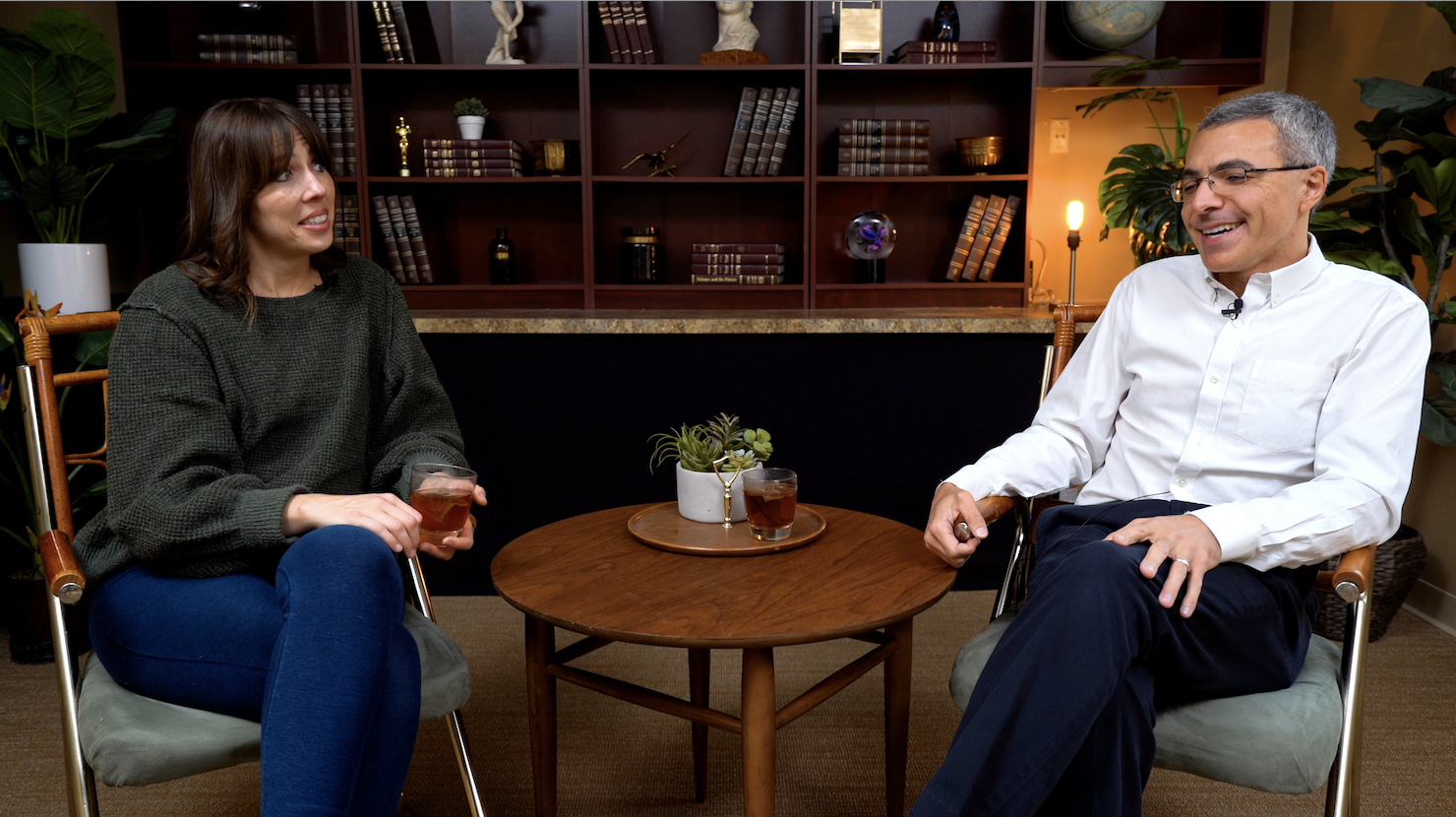
Meet your hosts:
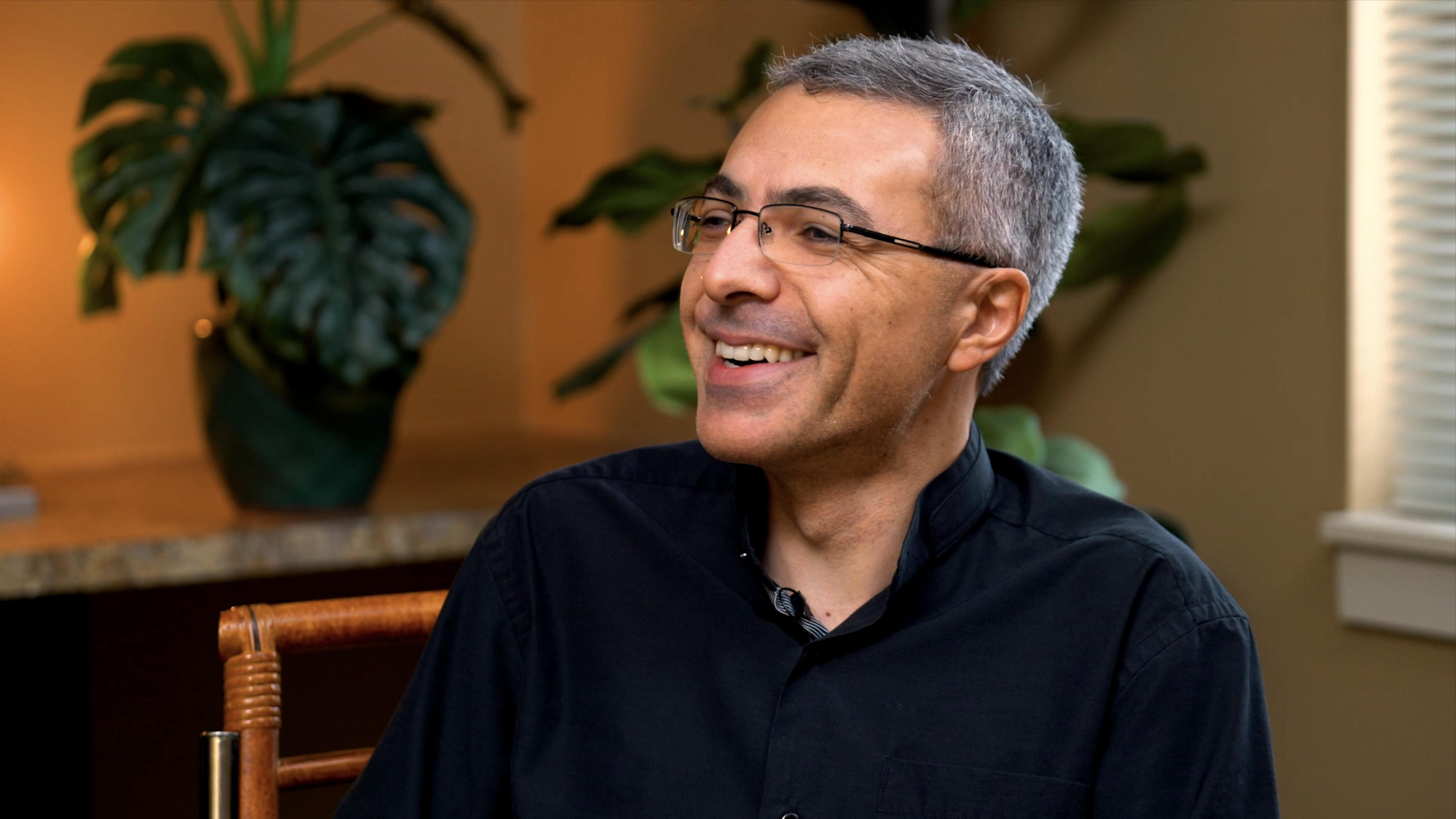
Dr. Elisha Yaghmai
Host
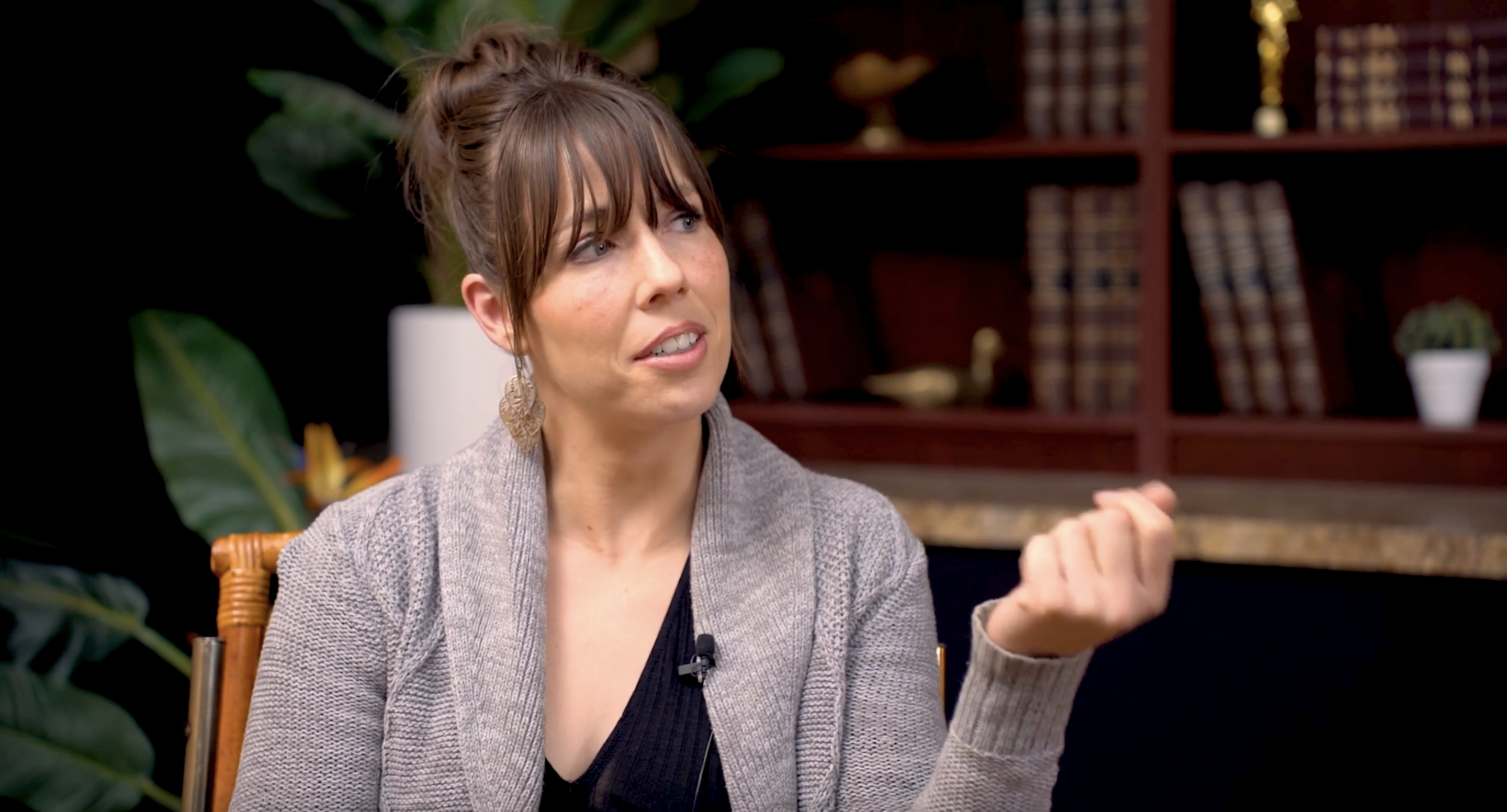
Jo O’Hanlon
Host




